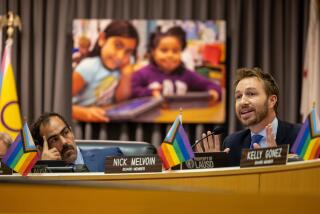Airport Will Seek U.S. OK of Flight Curfew : Burbank: Commissioners will ask the FAA to approve curbs ending nighttime and early-morning operations.
- Share via
BURBANK — In a significant victory for residents angered by aircraft noise, Burbank Airport commissioners voted 6 to 2 Thursday to seek federal approval for a mandatory curfew on all flights from 10 p.m. to 7 a.m.
The action enables the board, which oversees the airport’s operations, to seek assurances from the Federal Aviation Administration that it will back the curfew and enforce it against airlines that violate it.
The FAA has approved no curfew anywhere in the nation since new rules were instituted in 1990.
The vote sent the issue to the board’s legal committee, which was given two months to find lawyers who could fight for a tougher curfew on commercial airlines than the voluntary one currently in place.
“It is the first major conciliatory, good-faith effort put forward by the Airport Authority since it came into being,” said Commissioner Margie A. Gee of Burbank, who was recently named to the board and lives under the airport’s flight path.
Along with airport commissioners Philip E. Berlin of Burbank and William Paparian of Pasadena, Gee has been a strong advocate of the mandatory curfew, saying it would resolve many complaints voiced by residents who live under the airport’s flight path.
The Burbank-Glendale-Pasadena Airport Authority, which oversees the airport’s operations, has set a voluntary curfew on commercial flights leaving Burbank between 10 p.m. and 7 a.m. and a mandatory curfew during the same hours on freight carriers, along with commercial jets and general aviation planes rated as having noisy engines.
Under the voluntary curfew, airlines are advised by airport officials to avoid takeoffs in that period, but three airlines continue to do so without penalty.
They operate six commercial flights that leave Burbank Airport between 6 and 7 a.m. on weekdays. Another seven land between 10 p.m. and 12:15 a.m. Landings are not covered under the voluntary curfew.
The airport has about 180 landings and takeoffs daily.
“If you were a carrier that decided--on the next schedule change--you wanted to operate an aircraft before 7 a.m., you submit your schedule to the Airport Authority. There’s really no enforcement, and that’s basically it,” said John Thomas, a station manager for Southwest Airlines, which has regular flights to Oakland and Las Vegas leaving Burbank at 6:10 and 6:55 a.m.
Southwest Airlines, he added, started the early flight to Oakland last year to compete with a competitor’s flight out of Burbank at 6:30 a.m. and soon found strong customer demand.
“Most business people like to start the day before 8 a.m.,” Thomas said, “and if you can get them to Oakland to catch a cab . . . it gives you an advantage over another airline that can’t do that.”
Federal legislation enacted in 1990 prohibits airport operators nationwide from imposing new restrictions on the operations of commercial aircraft without the approval of the FAA and raised the standards for proving that a new curfew is needed.
Since 1990, the FAA reports, there has not been a single airport in the country that has successfully met all of the criteria required by federal officials to approve new curfews and other restrictions on aircraft operations.
The criteria include being able to show that the curfew’s noise-control benefits outweigh the potential losses from disruptions to airline services, said FAA environmental specialist Tom Bennett.
Berlin, a new commissioner from Burbank, remained confident that the FAA would approve the mandatory curfew and blamed his colleagues on the board for not trying to establish one sooner.
He said he thought the attitude by some commissioners has been that “any curfew amounts to closing the airport, which I think is totally wrong.”
“The attitude is, whatever the airlines want, they get,” he said.
More to Read
Sign up for Essential California
The most important California stories and recommendations in your inbox every morning.
You may occasionally receive promotional content from the Los Angeles Times.










